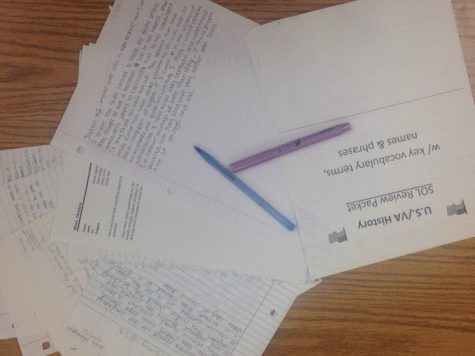Advanced Placement or Childhood Erasement?
AP courses should not be offered to underclassmen.
It’s been a long, tiring day of school and you just want to go home and relax. You watch the clock tick, slowly, just one more class left until you’re home free—but wait! That’s not exactly how your Friday afternoon is going to play out. You dread what class is about to come next: (Insert an extremely difficult AP course here). You walk into the classroom, legs trembling as you sit down. The teacher says to copy down the night’s homework, when you look up to see what it is. 30 long, dreadful pages of reading in your AP textbook and a DBQ essay due next class. There go your plans of relaxing and taking it easy after school. At this point, it’s clear that Advanced Placement classes are just too stressful for younger students and aren’t suitable for sophomores or freshmen to take.
First of all, AP classes are losing their value as a challenging course. This is because so many people are taking them that colleges don’t find taking an AP class something that’s striking anymore, making them much less worthwhile to take. AP is called Advanced Placement for a reason; they’re intended to be college-level classes taken in high school. When the program was first started, it was used for small numbers of students who needed more challenge than high schools normally provided. Now, with everyone who wants to get into their first-choice college taking AP courses, they have gotten watered down to the point where they’re roughly the equivalent of the standard “college track” courses of 40 years ago, plus, more colleges are refusing to give credit for passing the AP exam.
Secondly, the stress and workload that is involved with AP courses is too much for underclassmen to handle. Reyna Yang, a freshman at Langley, takes AP Human Geography and has some advice for her fellow students. “Underclassmen should not take AP courses. It’s a lot of work that some students are not yet used to,” she said. It’s a whole new atmosphere in the class that kids have a hard time coping with. Most AP classes move at a very fast pace and a lot of the information that students are assessed on aren’t covered in class. Students are expected to self-teach themselves some of the topics because teachers may have covered them very briefly. “Because we are coming from middle school, we may not have been exposed to certain aspects of an AP class, and because this is a grade that will go with a student the rest of their high school career, it’s ideal if a student waits until they are fully prepared and ready,” Yang said.
Additionally, there is a lot of information that is learned freshmen and sophomore year that is expected to be known in an AP class. “[AP World History] is definitely one of the harder courses I’m taking this year. There’s a lot of reading, quizzes often, also lots of writing, so overall it’s somewhat hard, but it’s manageable,” said sophomore, Jack Dunn. The fact that AP classes are available to all freshman and sophomores leads to many students taking them when they probably shouldn’t’ be. Taking an AP class is one thing, but getting a good grade in one is another. If you think that you can do both and handle the immense stress and workload, then go for it, take an AP class. But in my opinion, they shouldn’t be offered at all because most freshmen and sophomores just aren’t ready for what AP courses have to offer.


